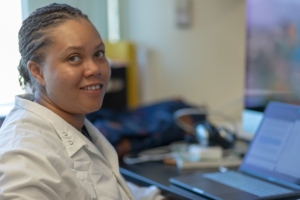
Ebony Flowers (photo by Sergio Bianco)
For Ebony Flowers, a postdoctoral fellow in the USC Stem Cell laboratory of Min Yu, doing science is ultimately about helping patients.
“The fact that Min Yu’s Lab is looking at actual human samples from breast cancer patients, and I’m looking to see how this process of metastasis occurs in humans is appealing. You can actually see that this could potentially lead to therapeutics,” said Flowers, who has been awarded the Choi Family Postdoctoral Fellowship, which provides support to recruit exceptional postdoctoral fellows to USC Stem Cell laboratories.
As the daughter of an electronic engineer and a computer science teacher, Flowers always possessed an inquisitive mind and a natural curiosity about how things work.
She grew up in the South Bay, near Los Angeles, and pursued her bachelor’s degree in biology at California State University, Long Beach. Her original intention was to become a reconstructive surgeon, treating patients with major injuries and birth defects such as cleft palate. But after hearing Nobel Laureate Mario Capecchi give a special lecture on gene editing, she became intrigued by medical research. She joined a lab that studied the development of fruit fly larvae, and decided to pursue a biotechnology certificate with a concentration on stem cell research.
“I don’t know if I had the personality type to deal with some of the situations that come along with working in the medical field as a surgeon,” she said. “It’s good to see all the triumphs, but it’s also very devastating to me to see all the hardship that people have to go through. So that’s why I appreciate research the way that I do, because it’s another way of helping with these medical conditions.”
After graduation, she gained more research experience by participating in an internship program of the California Institute for Regenerative Medicine (CIRM) in a laboratory at the University of California, Irvine. For nearly a year, she studied Cornelia de Lange syndrome, which involves birth defects, growth deficiencies and other serious symptoms.
She then entered the PhD program at the University of Texas Southwestern Medical Center, where she studied kidney development and polycystic kidney disease in the laboratory of Professor Thomas Carroll.
When it came time to pursue postdoctoral training, she wanted to return to a familiar city, Los Angeles, while venturing into unfamiliar scientific territory.
“I wanted to do something different and challenge myself again,” she said. “It makes my skill set a lot more broad, because studying the same thing, just in a different location, is still studying the same thing.”
As the Choi Family Postdoctoral Fellow at USC in the laboratory of Min Yu, Flowers is exploring how breast cancer cells adjust their metabolism to enable them to form metastases in distant organs, such as the lungs, brain, liver or bone.
“I am open to where the science goes,” said Flowers. “If there’s a good question, and there are ways that we can figure out how to answer that question, then I’ll follow the path. I’ve studied everything from flies to worms to mice to now human disease. I’m looking forward to how this work can best benefit developing diagnostic and therapeutic aspects of medicine.”